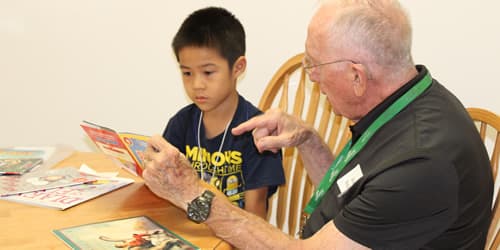
A summer camp designed by the Cato College of Education is providing a free, literacy-rich experience for dozens of east Charlotte elementary students while helping researchers uncover best practices for programs of the future.
Currently in the midst of its second year, the four-week, all-day summer camp is hosted on the campus of the Aldersgate retirement community and funded by donations from the Reemprise Fund and the Winer Family Foundation. The program provides daily, one-on-one literacy support for elementary school students who struggle with reading.
Data from 2016 indicates it prevented the summer regression in reading skills, which is particularly common in low-income communities, said Kristen Beach, a UNC Charlotte reading professor leading the analysis of the program.
"The students also experienced strong gains in oral reading fluency and accuracy across the summer months,” she said. “We have reason to suspect that rising third graders also improved in reading comprehension, and that rising second graders improved on early literacy skills, based on data we received from the school district.”
This year, the 68 participants hail from Windsor Park, Merry Oaks and Winterfield Elementary Schools and Oakhurst Steam Academy; each day, they receive two hours of intensive reading support from a rotating cast of coaches and spend the rest of the day at traditional summer camp activities. The students selected for the camp are all below grade level in reading proficiency and approaching their third grade year, a pivotal one for reading.
Ninety-six percent of students who read proficiently by third grade will graduate on time, while those who are not on grade level by third grade are four times more likely to drop out of high school. The summer reading camp is intended to support the goals of Read Charlotte, a community initiative aimed at doubling the number of children reading at grade level by third grade from 40 to 80 percent by 2025.
“Community service and research are essential components of what we do at the Cato College of Education. Our commitment is made clear through Dean McIntyre’s three years of work taking this camp from dream to reality,” said Bill Anderson, who leads community relations efforts for the college.
Some parents said the program is already making a noticeable difference.
“One of my daughters has really struggled with reading,” said Carlos Morales, who has two children attending the camp. “I’ve noticed a big improvement in her reading ability. We’re moving into chapter books now, which is something we wouldn’t have even considered trying before.”
The immersive month-long experience is the combined effort of the Cato College of Education, Charlotte-Mecklenburg Schools, Aldersgate and Ourbridge for Kids, a nonprofit that supports Charlotte’s refugee and immigrant communities through enrichment programs. The team approach reflects the recommendations of the Charlotte-Mecklenburg Opportunity Task Force report, which stressed the importance of community collaboration in addressing the city’s longstanding issues with economic mobility.
Prior the camp, UNC Charlotte literacy faculty train teachers from CMS schools, residents of Aldersgate and Cato College of Education students on “Sound Reading Partners,” a research-based reading intervention.
“It’s been a very rewarding process. At the beginning, keeping my student on task was sometimes a challenge. But recently I’ve seen him really enjoying reading and taking initiative on his own,” said one Aldersgate resident and reading partner.
For CMS teachers, the camp addresses a common issue in reading development.
“By being a part of this camp, students are avoiding that ‘summer slide.’ Rather than taking a step back academically when school starts because of the loss of instruction during the summer, they are maintaining skills that make for a seamless transition into the school year,” said David Flores, ESL teacher and school liaison for Windsor Park Elementary.
Participants’ reading progress will be monitored throughout the study and their outcomes compared against students who did not attend the camp. Researchers will begin analyzing that data in early October. Ultimately, the pilot program will lead to a new model for summer literacy programs.
Carlos Morales said the camp is a sign of a new attitude toward the area. “To me this means the community cares, and you don’t always see that on this side of Charlotte, where we feel like we’re sometimes pushed to side. Seeing these groups come together to help is pretty huge.”